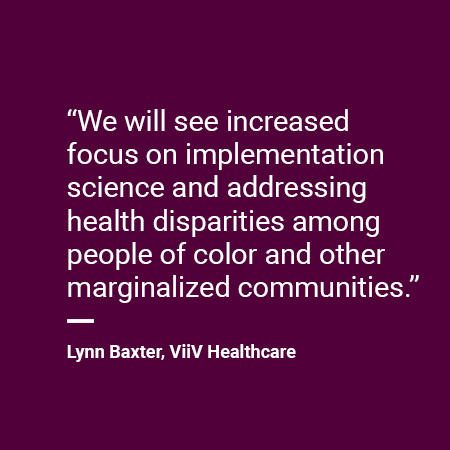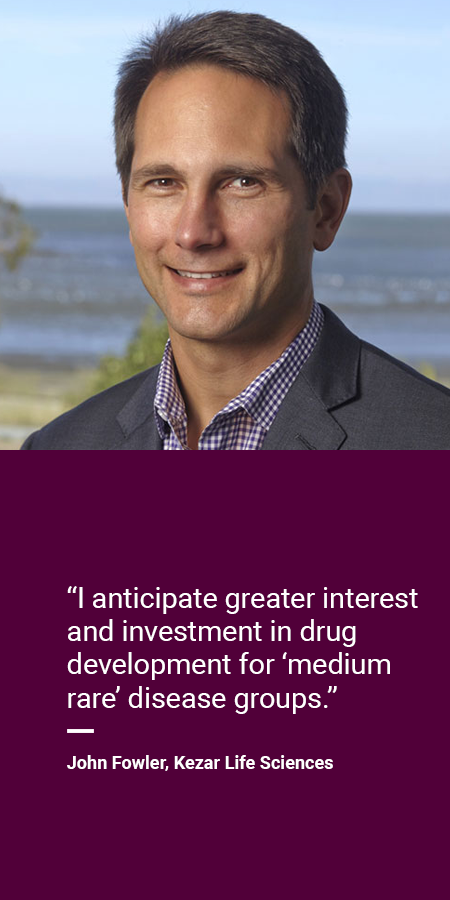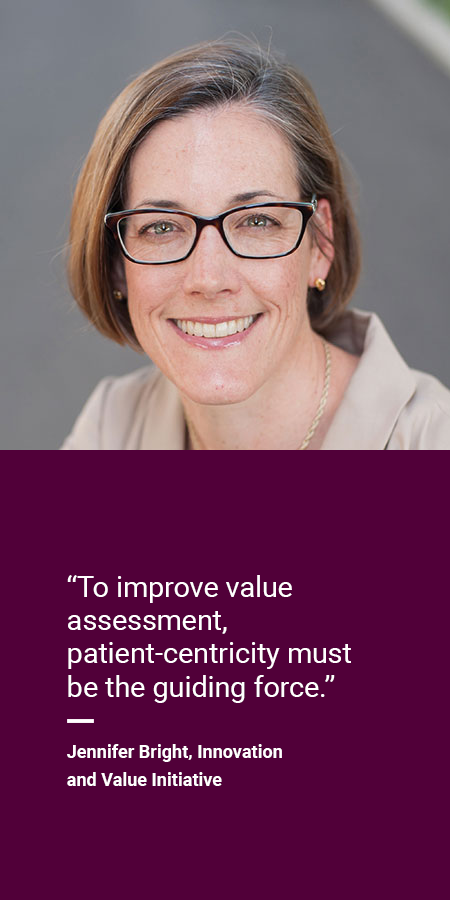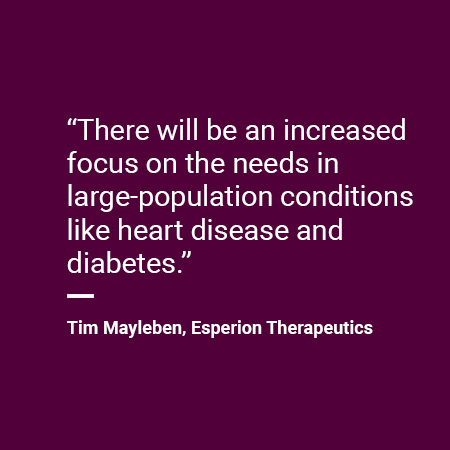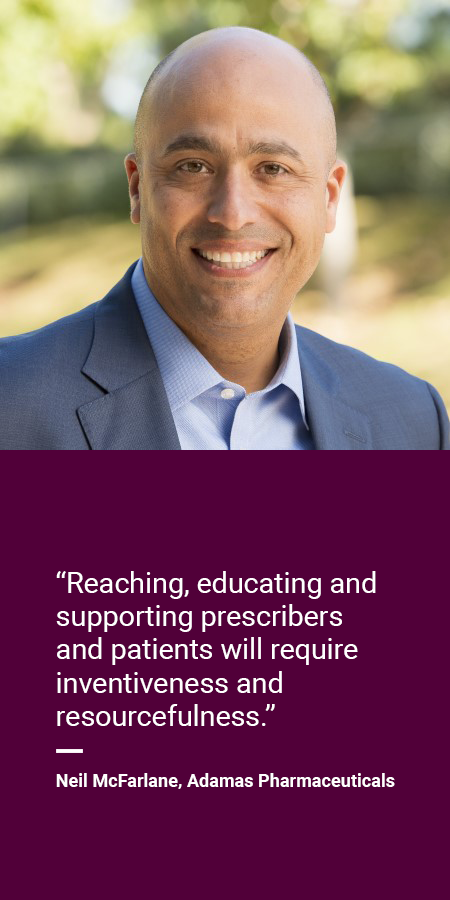Scrip Asks…What Does 2021 Hold For Biopharma? Part 3: Patient Access To Health Care
Level The Playing Field, Say Pharma Executives
Executive Summary
Executives share their expectations and hopes around the multi-faceted topic of patient access to medicines. From health inequities to value assessment and reimbursement trends, expectations for change abound.
SCRIP ASKS…What Does 2021 Hold For Biopharma?
A broad survey of the industry's expectations for the year to come.
Every December, Scrip asks industry leaders and experts to share their expectations for the year to come. With responses from more than 200 professionals, Scrip Asks…What Does 2021 Hold For Biopharma? provides an unprecedented insight into the biopharma universe's collective crystal ball.
The full list of installments:
- Tackling COVID-19
- COVID-19 Shock Waves And Silver Linings
- Patient Access To Health Care
- Technology And Disease
- Business Environment And Strategy
"COVID-19 is a great reminder and a testament that biopharma's core mission is to meet patient and society's needs." These words of Lihua Yu, president and chief data science officer of Eisai Co., Ltd.'s precision oncology subsidiary H3 Biomedicine, resonated time and again among the responses from the more than 200 industry leaders who answered our call to share predictions for 2021.
This third installment of our Scrip Asks… annual forecast series is therefore dedicated to perspectives that could be loosely grouped under the general theme of patient access to health care.
Among the areas identified as ripe for change in 2021 were the need to reduce inequity in access to medicine, ways to facilitate participation in clinical trials at the same time as improving the trials themselves, and the approach to diseases of large populations.
Meanwhile, several industry observers pondered the perennial topic of pricing and reimbursement. Unsurprisingly, public health emergencies also came up.
Click on the cards to read predictions by theme.
Reducing Inequities
The Black Lives Matter demonstrations around the world, triggered by the murder of George Floyd in the US, brought more sustained attention to racial inequality in 2020. COVID-19 only served to further accentuate imbalances in access to health and health outcomes.
Lynn Baxter, head of North America at ViiV Healthcare, observed: "During 2020, we faced a global pandemic that impacted our economy and politics, while also elevating our awareness of health care and how it's accessed in the US."
"Recognition of health inequities is not new, but the COVID-19 pandemic has helped bring this issue to the surface in a clear way, and we need to address it and find solutions to make sure everyone, despite their location, ethnicity, income, insurance, or socio-economic status, is able to access health care in a more equitable way," said Gwen Nichols, chief medical officer of the Leukemia and Lymphoma Society.
"As a hematologist/oncologist I am pained when I hear that people have to choose between the food on the table and their medical care, having to delay or avoid their medical screenings and life-saving treatments because they cannot pay for them. All the innovative treatments that we are funding and developing are only beneficial if people can actually access them.
"As we head into 2021, there is an urgency to address the issue of health inequities and a strong commitment from all members of the health care industry to find solutions that will allow equitable access. Together, we have the ability to tackle this, but our passion cannot wane and our mission cannot be diverted until it is solved."
Baxter predicted: "In 2021, I believe we will see more innovation around access to health care, including an increased focus on implementation science and addressing health disparities among people of color and other marginalized communities. These more creative approaches to health care will ensure we are better prepared for future pandemics while continuing to find creative solutions for other public health crises, like HIV."
Doug Langa, executive vice president, North America operations, and president of Novo Nordisk Inc., expected that in 2021 "society will challenge our companies to collaborate more as innovators and corporate citizens." He argued that industry should "do better at calling out and reducing the disparities that may prevent people from getting the care they need and working across the public and private sectors to create meaningful change." In his view, the US should make fighting chronic diseases like diabetes and obesity national priorities "because we saw how people with these conditions, especially within communities of color, were hit hard."
"Fair and equitable access to potentially life-changing therapies is more important than ever before, especially within the context of the ongoing pandemic," said Neena Patil, senior vice president and general counsel, Jazz Pharmaceuticals. "Virtual health services and delivery have surged this year, but overall, the health and well-being of millions has suffered under the limitations required to help reduce the spread of the virus."
She believed that collaboration would be key to rectifying inequity. "No company or organization alone has the insights or means to solve for health disparities across economic, racial, and other lines that stand in the way of fair, equitable access to care and affordable medicines. 2021 presents a unique opportunity for collaboration on sustainable solutions that benefit all of society and holistically improve the care, health and well-being of underserved communities."
For Percival Barretto-Ko,Astellas Pharma US Inc.'spresident, companies need to look within as well as without: "We can expect continued industry-wide focus on equity and access – which needs to start within our own companies so that we can truly reflect the patients and providers we serve."
"2021 will be our time to act," declared Paul Hastings, CEO of cell therapy company Nkarta Therapeutics. "As we start this new chapter, we have the opportunity to annul the recent injustices that have harmed our industry and people, including immigration bans and human rights violations. As drug innovators, it's our duty to provide affordable access to all our therapeutic discoveries, not just the all-important COVID vaccines, so patients have the medicines they need. And as an industry that takes its social responsibilities seriously, we remain committed to standing up for justice, diversity, equity and inclusion."
Jocelyn Ashford, Eidos Therapeutics, Inc.'shead of global patient advocacy, expected continuing progress from companies in improving equitable access to clinical trials in particular. "The conversation evolved to acknowledge the need of the biopharma industry to build trust among those that are often under-represented to demonstrate a long-term commitment to these communities. Trust opens the door to thoughtful collaborations, a better understanding of how treatments will work in communities that need them most, and a network of accountability. We are starting to see companies seek to understand under-represented communities and give them a seat at the table so that their needs throughout the clinical trial process may be addressed with tailored approaches," he said. "We must invest in building a diverse set of investigators, set expectations with clinical trial sites that prioritize a representative population in trial recruitment, and provide tools to have deeper discussions with those diagnosed and their loved ones."
Genentech, Inc. CEO Alexander Hardy also recognized the need for change in the clinical trials environment. "For too long, clinical trial participants have not been representative of the broader patient population. With COVID-19 bringing the challenges diverse patients face into sharper focus, the industry must take more action to address health equity."
With inclusive research an area of focus for Genentech, Hardy highlighted one example from the company's COVID-19 clinical trial program in which "about 85% of patients enrolled were people of color, proving that including underrepresented groups in clinical trials is not only possible, but that it can be done quickly, even during a pandemic."
This approach will continue at Genentech over the coming year, he said. "In 2021, we must be ambassadors of the industry standards set for inclusive clinical research and come together to make bold changes that advance health equity for all people. We will build trust with patient communities to better understand their experiences, their needs and the obstacles that have prevented participation in clinical trials. In response, we will take action - ranging from taking trials into the community to making significant philanthropic investments - to address these obstacles, provide support and enable access for communities of color.
"We call on the industry to join us in developing and studying treatments that can benefit all patients."
John Fowler, CEO and co-founder of autoimmune and cancer therapeutic developer Kezar Life Sciences, Inc. ,was "hopeful that we will see a robust commitment from all corners of the biotech ecosystem to enable social and health equity in the United States." He noted: "As our country struggles to address systemic social justice and health inequity issues, many companies are reflecting on how they can better serve minority communities, especially when they are disproportionately impacted by disease and poor health outcomes. With the recent introduction of the FDA's own guidance to enhance diversity in clinical trials, in 2021 I expect to see a wider integration of regulatory and clinical planning with these communities in mind for new drug development. I look forward to being a part of an industry that makes extra efforts to be a force for good in the communities that need it most but have been historically underserved by our industry."
Across the Atlantic, Professor Dame Sally Davies, master of Trinity College, Cambridge, UK special envoy on antimicrobial resistance and former chief medical officer of England, asked: "Can we rebuild better?"
Noting how COVID-19 has "exposed and exacerbated inequalities and vulnerabilities in the UK and across the world," she warned that rebuilding must be done "fairly, to have more equal inclusive societies, or we're not going to deliver the sustainable development goals."
She also highlighted the pressing need for COVID-19 vaccines to be distributed widely around the world. "Not only must we work on vaccine hesitancy, and make sure the vaccines get to people, but they've got to get everyone, they've got to get to low income countries equally as to the rich countries." And she referred to the importance of good access to medicines in the battle against infectious diseases more broadly. "We've got to make sure that our supplies of antibiotics and anti-infectives are sustainable, and that there's good access, because not all drugs are licensed and available in all countries and not all can be afforded."
Clinical Trials
While the approval and reimbursement of medicines can dictate who has access to therapeutics, clinical trials offer a health care opportunity for participants beyond their primary purpose of providing evidence to take new drugs to market. It therefore stands to reason that accessibility of clinical trials should be considered if the industry wants improve patient access to health care.
"MD Anderson manages one of the largest portfolios of clinical trials for patients with cancer, and we will focus in the future on making the most of every person's participation and increasing access to innovative cancer studies," stated Phil Jones, vice president, Therapeutics Discovery, at The University of Texas MD Anderson Cancer Center. "These developments should generate lots of excitement for our patients and the entire biomedical community, given the unprecedented advances in understanding disease processes and the explosion of new cancer therapies entering the clinic."
The Leukemia and Lymphoma Society's chief medical officer Gwen Nichols homed in clinical trial access too: "One of the areas we are working on and expect to see change in 2021 is access to clinical trials by those living in rural and tribal areas by having experts train and educate local medical professionals to carry out many of the clinical trial services typically conducted at the major academic centers, that are often located in major cities or areas that patients can't travel to because of distance or financial constraints."
As well as widening the population of patients who access trials, executives expect positive change in patients' experience of participating in trials.
One area where Forma Therapeutics Inc. CEO Frank Lee hopes to see increasing focus is the "proactive accommodation of patients during clinical trials amidst COVID (and beyond)." Practical actions to support patient participation could include the offer of extended travel support and overnight accommodation, and offering sites that want to run COVID-19 pre-screening tests or need additional PPE support in the form of pass-through costs – all steps that Forma has taken as part of its ongoing multicenter placebo-controlled Phase I trial of a sickle cell disease treatment.
Bruno Gagnon, SVP development operations at BridgeBio Pharma, Inc. and Eidos Therapeutics, Inc., hopes that "new efficiencies implemented during the pandemic will stick around, making trials a more approachable, seamless experience for trial participants so that we can advance the development of medicines and help as many patients as quickly as possible." He believes regulators are "willing to adapt to new approaches," such as allowing for telehealth appointments or sending investigational products direct to patients.
"I believe 2021 will allow for continued changes to the way trials are conducted, for the better of patients and their families," said Stuart Peltz, founder and CEO of PTC Therapeutics, Inc. "With the evolution of virtual and remote trials, patients no longer need to be put at increased risk by traveling into hospitals or trial sites."
Telehealth
Telehealth has grown explosively in response to COVID-19 restrictions, and it seems unlikely that it will fade away quietly once the pandemic abates. "Digital therapeutics, telemedicine and remote monitoring through wearables will continue to boom as people look to access health care away from the clinic," predicted Mimi Keshani, vice president of operations at deep tech start-up Hadean.
"There will be continued pressure for pharma companies to innovate around telemedicine and ensure patients get access to health care practitioners using digital means," predicted Davinder Gill, former CEO of Hilleman Laboratories Pvt. Ltd., an equal joint-venture partnership between Merck & Co., Inc. and the Wellcome Trust.
"With telehealth we'll be better suited to provide faster and more frequent therapy interventions, which can help evolve our standard model of care," commented Stuart Peltz, founder and CEO of PTC Therapeutics, Inc.. "While the pandemic has made us find new ways to work, we've actually uncovered many improvements, which we will bring forward into the New Year. From challenges come opportunities to evolve and become more efficient."
Managed Care
The benefits and shortfalls of managed care policies have been highlighted by the pandemic. Furthermore, societal and economic upheavals caused by the health crisis have added to pressure for system change. Obstacles to patients accessing medicines have been exacerbated by COVID-19, although creative solutions developed during the pandemic could provide a path forward for longer term change. Some pharma leaders recognize that industry has a role to play in this transformation.
"As result of the pandemic, some patients may have missed medical appointments and neglected routine care. To account for this lost time, preventive medicine and disease management will become a top priority in 2021," said Peter Anastasiou, executive vice president and head of North America at Lundbeck, which specializes in medicines for central nervous system disorders. "We have an important role to play in ensuring that people have timely access to the preventive and maintenance therapies they need. While step-therapy protocols are almost always burdensome, the fail-repeat-fail-repeat nature of these restrictions may be particularly detrimental in this environment. We need to minimize the hurdles patients encounter on their path to appropriate care, and so in 2021 we will continue to work to ensure people living with brain diseases – ranging from depression and schizophrenia to migraine – have access to the right care at the right time, so every person can be their best."
"Biopharma must continue to show innovation not only in drug development, but in providing access to the drugs once they are developed and approved," said Todd Zavodnick, CEO of Dermavant Sciences Ltd., which develops immuno-dermatology treatments. "At the helm of a biotech startup company poised for commercialization, I also see the tremendous opportunity to further leverage artificial intelligence for personalized engagement and experiences of our future patients and their health care providers. It's important to listen to the people that are going to use your medicines and understand this world that we live in today. Beyond the purely medical aspects, there is a large managed care business side to it, and we have to ensure that physicians and patients can get access to our medicines. AI has a role to ensure greater efficiency and success in that regard."
Pricing And Reimbursement
"Value assessment will be increasingly important for the biopharmaceutical industry in 2021," predicted Jennifer Bright, executive director of Innovation and Value Initiative, a US non-profit research organization focused on applying scientific principles to value assessment in medicine. "The incoming Biden administration is said to favor a German-style approach to drug pricing, which may include a centralized drug value assessment agency to determine what constitutes fair pricing. There are significant implications should the US decide to import value assessment mechanisms wholesale from countries with publicly financed health care systems. In addition, employers are increasingly asking their payer vendors for more quantification of therapeutic value for their formulary and coverage decisions.
"As the role of value assessment increases in health care decision making, it has to evolve beyond current siloed comparisons within a class or intervention type to consider benefit, risk, and cost trade-offs for optimal treatment approaches.
"To improve value assessment, patient-centricity must be the guiding force. Stakeholder communities, most importantly patients, should be included in the process to build consensus about methods and how value assessments should be used within a US context. Patient perspectives and lived experience must be brought into value assessment modeling at the onset. Modeling methods need to be modernized so the factors that patients value can be quantified within an assessment.
"Lastly, for value assessment to be effective in the US, an open dialogue and trust between decision makers needs to be established. Accelerating the development of open-source modeling and application, as well as making assumptions and coding transparent, would allow public validation and stimulate replication across disease and interventional analyses."
Hand in hand with value comes price. "The new US administration will argue for lower prescription and generic drug pricing, which could be a component of a government option introduced as component of legislative improvements to the Affordable Care Act," said Robert Fallon, president, CEO and co-founder of oncology drug developer Phosplatin Therapeutics.
For Davinder Gill, former CEO of Hilleman Laboratories Pvt. Ltd., "the 2020 experience of the pandemic will liberate significant efficiencies that will result in pharma products and health care in general to become more affordable to the public."
Nevertheless, the cost of advanced products, such as cell and gene therapies, will remain a thorny issue. "There will be continued momentum towards implementing these therapies for broader patient populations, but it will become ever more critical for the outcomes to justify price," warned Armon Sharei, founder and CEO of cell therapy developer SQZ Biotechnologies Company.
Diseases With Big Populations
"If there is one thing COVID should have taught the industry it is the importance of tackling big problems — that is, diseases that affect large numbers of people." Pointing out that pharma companies have "by and large, stepped away from that opportunity largely because the strategies that worked in an earlier time don't work in an era of managed care", focusing instead on rare diseases "where payers have had little bargaining power over price," Roger Longman, chairman and founder of health care advisory firm Real Endpoints, think the pendulum will swing the other way again.
"Companies and their investors will begin to learn how to provide cost-effective therapies – with cost-effectiveness defined by their payer customers – to larger populations. For example, they will experiment with, and with luck eventually figure out, how to radically reduce the time and cost of development and commercialization to allow for traditional biopharma investment returns with prices low enough to allow for widespread uptake in as-yet-unheard of time frames: 30-50%-plus market shares within five years of launch."
Jonathan Mow, president and CEO of PhaseBio Pharmaceuticals, Inc., emphasized the importance of improving treatment of a particular condition that affects many people: heart disease. "Heading into the COVID-19 pandemic, heart disease was the leading cause of death in America. The pandemic has led to a reduction in hospital visits for heart attacks and strokes, with patients instead dying at home from these cardiovascular conditions. Additionally, there has been a marked decline in preventative care check-ups and utilization of important prescription cardiovascular medications, such as blood thinners. As vaccines become broadly available, 2021 will hopefully be remembered as a year defined by a gradual return to normalcy and a safe environment in which some of our most-pressing, chronic health care conditions can be addressed; a time to once again acknowledge the massive implications that cardiovascular diseases have in our country and across the globe," he told Scrip. "Looking ahead, there's tremendous opportunity for innovation in this field, including developing life-saving treatments for severely ill patients."
Tim Mayleben, president and CEO, Esperion Therapeutics, Inc., had a similar take. "In 2021, we believe there will be an increased focus on the needs in large-population conditions like heart disease and diabetes," he predicted. "COVID-19 has shown that developing drugs for broad populations can have a huge impact on public health. Too often, the incentives in the health care system promote niche products with high prices, when what society really needs – what society would really value – is medicines that could have an impact on large swaths of the public. COVID-19 disproportionally affected those with underlying health conditions – including heart disease, diabetes, and the like – but it's been more than a generation since there was sustained, broad-based innovation in these disease areas that affect so many American lives every day. We need to correct the incentives in our health care system to prevent a market failure, and we think that will be the conversation we will begin having with more seriousness in 2021."
Diseases With Small Populations
Striking a note of optimism for the rare disease medicine space was Ron Cooper, president and CEO of Albireo Pharma, Inc., which recently received priority review from the FDA for its lead candidate for a rare liver disease. "Through July 2020, the US FDA had approved 51 orphan indications, and in 2021, we hope for continued focus on bringing new treatments to rare patient populations," he said. "With a new administration taking office, the industry must be prepared to collaborate and operate with transparency so we may obtain speedy approvals and ensure patients in need have access to treatments."
Ipsen North America's CEO Richard Paulson noted the ongoing challenges in the field: "Over the last two years, we have seen record orphan drug approvals and continued commitment to clinical research, as evidenced by the FDA granting funding for six new clinical trials in the rare disease space in 2020. However, rare disease patients continue to face long-standing barriers that have remained unresolved for years. Things like delay in diagnosis, and access limitations continue to burden this patient population, and according to a recent study by NORD [National Organization for Rare Disorders], 50% of patients and caregivers today attributed diagnostic delays to a lack of disease awareness, and 42% believed delays were caused by limited medical specialization." However, he thinks improvements are coming, with industry playing its part.
"In 2021, I see biopharma taking another step forward in the arena of 'patient-centricity' by furthering our partnerships with patient-thought leaders and integrating their insights earlier in the clinical development and pre-commercial stages," said Paulson.
"Larimar is following how developing therapeutics for rare diseases continues to evolve in 2021," said Carole Ben-Maimon, president and CEO, Larimar Therapeutics, Inc., another company in the rare disease drug development field. Like Paulson, she emphasized the need for meaningful communications with patients. "In 2020, companies needed to become increasingly nimble, given the new challenges presented by COVID-19 in a space already limited by nature of prevalence, small patient populations, and natural history data. Forging stronger relationships and robust communications with advocacy groups will help educate patients about clinical trials and treatments so they can make informed decisions about what options may work best for them."
Kezar Life Sciences, Inc.'s John Fowler, meanwhile, saw a new niche expanding. "I anticipate greater interest and investment in drug development for 'medium rare' disease groups with larger populations than micro-sized subset populations and ultra-rare indications. Although ultra-rare diseases have commanded outsized attention in recent years, we expect to see a new wave of novel treatment options for broader underserved patient populations."
But Real Endpoints' Roger Longman believed that the dynamics within the orphan drug space would become more challenging.
"As rare disease therapies eat up larger and larger portions of the drug budget, and as these categories get more crowded, payers gain more incentive and more power to influence which rare-disease drugs get used, or get used quickly. In short, the same price pressures that chased pharma from broader disease categories will soon apply to the rare-disease categories into which they fled," he said. "Rare disease companies will therefore learn to adopt increasingly creative and payer-focused development and commercial strategies. For example, they will be forced to do what heretofore they have largely been able to avoid: creatively contract for preferred access, taking significantly more pricing risk than they have ever had to do before in order to succeed commercially."
New Drugs
Greg Divis, CEO of Avadel Pharmaceuticals plc, thinks the industry's response to COVID-19 has raised the bar for how it can serve patients more broadly. "As we've seen over the past year, on a global scale, the rapid development and distribution of multiple COVID-19 vaccines speaks to the truly unique ability and potential our sector has to offer in an effort to improve the lives of patients every day. This sort of scientific breakthrough, at a historic pace, is setting a new standard of delivering innovative treatments to patients and creating opportunities for the public and private sectors to align on what is in the best interest for patients globally," he told Scrip.
Mark Enyedy, president and CEO of ImmunoGen, Inc., which is active in antibody-drug conjugates, an area that is yielding a large volume of approvals and late-stage development, was of the same mind, highlighting oncology as an area of particularly rapid progress. "As we move into 2021 and beyond, it will be critical for the industry to ensure access to these innovative therapies for all patients in need," he said.
Mike Raab, president and CEO of Ardelyx Inc., was another who expects the coming year to improve therapeutic options for patients. "The 2021 FDA PDUFA calendar is flush with the next class of biotech therapies on the horizon from companies large and small. The reputation of our industry was significantly enhanced last year with the world's focus on therapies and vaccines to address the pandemic," he said. "I believe 2021 will continue to be a high-profile year with new therapeutic innovations approved and available for patients in need." Ardelyx is awaiting an FDA approval decision on its product tenapanor for use in chronic kidney disease.
Carlos Buesa is founder, CEO and president of Oryzon Genomics SA, which develops epigenetic personalized medicine for cancer and central nervous system indications. He thinks patients will benefit from the growing scientific understanding of disease and development of new drugs in more ways than one. "Recognizing that many broadly defined conditions, such as Alzheimer's disease, autism or schizophrenia, have a host of underlying molecular correlates helps demystify psychiatric and CNS diseases. Making these molecularly recognizable conditions addressable with drugs will also help change societal attitudes to psychiatric diseases. Just as vaccines reduce the fear of infectious disease, epigenetic drugs may cure patients and reduce social stigma."
Generics
Innovation aside, a key part of patient access to health care is the availability of affordable and effective generics, and these products themselves are evolving as new waves of medicines lose market exclusivity.
"Generic medicines play a critical role in driving health care system savings and sustainability. Complex generics, which treat serious and chronic medical conditions, are the future of generics," declared Christine Baeder, SVP and chief operating officer, US Generics, at Teva Pharmaceuticals USA Inc. She called for regulatory focus to help broaden access to such medicines.
"In 2021, FDA, through the Generic Drug User Fee Amendments (GDUFA) negotiations with industry, has an opportunity to ensure that patients have timely access to lower-cost complex generic medicines," Baeder went on. "We are hopeful that GDUFA III will be reauthorized with improved review processes for complex generics, enabling these important products to enter the market faster, which is a win for patients, the health care system and the US economy."
Diagnostics
Alex Ovadia, CEO of Check-Cap Ltd., which has developed an ingestible technology to detect pre-cancerous colorectal polyps, highlighted improvements to come in cancer screening. "2021 will continue to bring further innovation in the cancer screening field to advance solutions that can help diagnose warning signs of cancer effectively while reducing the need of hospital visits and invasive procedures," he said. "Although there has been a strong effort in the development of non-invasive screening options that detect cancer early through biomarker tests, the ultimate goal of the field is to detect polyps before they turn into cancer. We will continue to see development of solutions band technologies with increasing sensitivity and specificity for the detection of pre-cancerous polyps that can enable avoiding cancer altogether instead of just reducing cancer outcomes by early cancer detection."
"Diagnostics and their value will continue to gain momentum in all areas, particularly in terms of prevention and early detection," agreed Ken Chahine, CEO of HelioHealth, which develops tests for cancer based on artificial intelligence.
Communications
"How patients access their treatments and experience health care will forever change in the coming years," Chiasma, Inc.'s Raj Kannan told Scrip. This means that there is a need for the pharma industry to listen carefully to all stakeholders to ensure that health care and therapeutics are designed to best effect.
CEO of a company specializing in oral forms of orphan disease drugs that have hitherto only been available by injection, Kannan's business is built around the position that "the patient voice will become increasingly important for physicians to hear when making therapeutic choices – particularly the increase in patient preference for convenient, oral therapeutic agents in place of medically administered products."
Neil McFarlane, CEO of neurology-focused specialty pharma company Adamas Pharmaceuticals, Inc., also believes biopharma businesses need to focus on communication channels. "Business agility and creativity will be imperative in 2021 as the medical community continues to navigate the impact of COVID-19," he said. "While those physicians not on the front lines try to maintain continuity of care for patients outside of the pandemic, reaching, educating and supporting prescribers and patients during these times will require inventiveness and resourcefulness."
Supply Security
As COVID-19 began to grip the world in 2020, demand for some medicines rocketed, stockpiling gathered pace, and restrictions on travel and workplaces put global supply chains under strain. Patricia Hurter, CEO of Lyndra Therapeutics, a company developing ultra-long-acting pill forms of existing medicines, flagged this up as a patient access consideration.
"The coronavirus pandemic shifted the way we see and develop medicine for a variety of diseases and people on a global scale, particularly as it relates to manufacturing – what materials we use, how we ensure there is capacity during a crisis and what distribution looks like to ensure affordable access," she said. As a result of the pandemic the company sped up development of its product and the build-out of its manufacturing "to secure a pharmaceutical supply chain."
Public Health
"It is probably too early to call 2021 the start of the post-coronavirus era but the huge economic and social impact of the pandemic has led to political recognition of the utter dependence of advanced societies on the active control of public health and a vibrant, integrated health care sector," said. Michele Garufi, chairman and CEO of Nicox SA, the French ophthalmology company. "In ophthalmology, while the value of innovation primarily stems from maintaining and restoring the health of individuals, tremendous benefits also accrue to society from increase productivity, reduced dependency and reduced cost of care."
Evan Loh, CEO of antibiotics company Paratek Pharmaceuticals, Inc., warned of the paramount importance to public health of managing bacterial infections and antimicrobial resistance, and lamented the current situation.
"COVID-19 is a stark reminder that pandemics are an integral and humbling part of human history. Future pandemics are inevitable, and we must consider that the next pandemic could be caused by a resistant bacterial superbug," he said. "A sobering thought considering the current trajectory of the antibiotic market – a diminishing pipeline of innovative candidates, biotech companies facing bankruptcy and no big pharma commitment to the sector leading the talent in this space and their decades of experience to move out as antibiotic-focused companies struggle to raise capital and close their doors. Essentially, for some unfortunate individuals afflicted with multi-drug resistant bacteria, the pre-penicillin era is here. Soon the world may be without safe and effective antibiotics to combat deadly and resistant bacterial infections let alone be equipped to address a looming future pandemic risk.
"Paratek is in a unique position, operating in a marketplace where most of the competition has gone bankrupt, or pursued restructuring into a different sector and/or therapeutic area. Thanks to a combination of methodical scientific planning, focused strategic investments, financial discipline, and more than 10 years of ongoing research exploring the utility of [its approved antibiotic] Nuzyra [omadacycline] against biothreat pathogens that resulted in a Project BioShield award from BARDA [the US Biomedical Advanced Research and Development Authority], Paratek is one of only a few small biotechs in the antibiotic space left standing and the only one with a potential path to profitability. That's not a description of a vibrant and innovative drug development ecosystem – unacceptable at face value, a national security risk more broadly.
"95% of antibiotics R&D worldwide is conducted at small biotechs, like Paratek, and these companies don't have resources to gear up for a bacterial pandemic like we've seen with COVID-19. Change needs to happen today to ignite investment in this neglected space. The new Administration must take urgent action and help incentivize antimicrobial R&D by filling the dangerous legislative and regulatory gaps to ensuring market access and the commercial viability of the current cohort of antibiotics that are slated for approval in the next one to two years. Champions of the battle against antibiotic resistance, including former BARDA head Rick Bright, and those in Congress, will play an important role in shaping our country's preparedness for the next pandemic."
Additional reporting by Joseph Haas.














